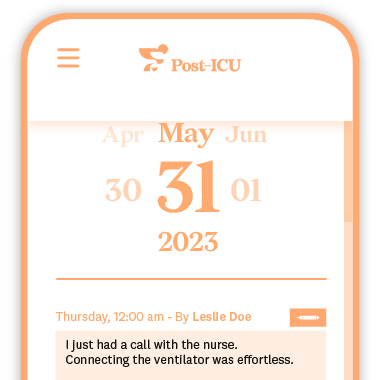ICU patient diaries hold the key to a more powerful healing journey. Not only for the ICU survivors themselves, but just as well for the ones who experienced their ICU admission from up close: family and friends. Indeed, ICU diaries are often also highly appreciated by professional caregivers, as a patient diary not only fosters clear communication between them and the patient’s loved ones, but it also brings them closer to really getting to know the patient. Finally, ICU diaries can contribute to the fulfillment of hospital management objectives as well.
Summary of this article
The ICU patient diary is a multifaceted tool. It is not meant as a substitute for a health record. Rather, an ICU diary provides a narrative, a source of empowerment, and a bridge for communication. As patients, families, and professional caregivers collaborate in keeping these diaries, they contribute to a holistic healing process that provides value beyond the confines of both health records and personal notes.
In this article, we will explore how an ICU patient diary differs from a conventional health record, how it differs from personal family notes, and how it can provide additional value beyond a health record, especially for hospital management and professional caregivers.
The difference between an ICU patient diary, a health record, and personal notes
To better understand what an ICU patient diary is, we also need to understand what it is not. Therefore, we will briefly define two materials that may appear similar to a patient diary, but are in fact different: the (electronic) health record, and personal notes written down by the ICU patient or their loved ones.
A health record is a comprehensive and systematic documentation of a patient’s health and medical history, containing details such as diagnoses, treatments, medications, test results, and vital signs. Its primary purpose is to provide an accurate and organized account of a patient’s healthcare journey, serving as a crucial tool for healthcare providers in delivering quality care.
Sometimes, family, friends, or the ICU patient themselves will keep personal notes. These are unstructured, smaller or larger notes taken on paper or on a personal device. The main difference between personal notes and a health record is that personal notes lack any form of healthcare professional input. Additionally, professional caregivers are usually unable to see these notes.
In contrast, an ICU patient diary is not meant for documenting the medical aspects of a patient’s stay. Instead, an ICU diary goes beyond clinical data, providing more context for both family members and professional caregivers. In an ICU diary, both family and professional caregivers can contribute. ICU diaries can delve into the emotional and personal experiences of the patient, capturing the nuances of their journey. Unlike the standardized and clinical nature of a health record, an ICU patient diary serves as a more personalized and holistic narrative, fostering a deeper understanding of the patient’s emotional state, the challenges they face, and (small) victories celebrated during their time in the ICU.
How does an ICU patient diary provide value for hospital management and caregivers beyond a health record?
Numerous studies have already clarified that ICU patient diaries are incredibly valuable for the patient and their loved ones. But what about the value of ICU diaries for professional caregivers? Dr. Wes Ely, MD, MPH, describes how they added value to his ICU in his book “Every Deep Drawn Breath”:

Book a free demo now to learn how our innovative solution Post-ICU is reshaping the ICU experience for patients and staff alike.
Various studies on ICU diaries have identified the following advantages for hospital management and professional caregivers:
- ICU patient diaries mitigate Post-Intensive Care Syndrome (PICS) and enhance patient-centered care. By offering patients and families an ICU diary, long-term wellbeing and health outcomes are effectively prioritized.
- ICU patient diaries enhance patient and family satisfaction. The diaries foster a collaborative approach to care and remind family members that professional caregivers see patients as living human beings. This contributes to their satisfaction with the care they received.
- ICU patient diaries save caregivers time and increase their job satisfaction. There are even initial studies suggesting that ICU diaries help mitigate burnout among ICU staff. Families will make fewer calls, saving professional caregivers time. At the same time, caregivers can connect on a more personal level with patients, fostering a sense of purpose and accomplishment in their professional role. Read our Griffin Health Use Case to learn what results they booked with our digital Post-ICU diary.
The above graph summarizes the findings of multiple studies that compared quality of life (measured by the SF-36 global health score) for ICU survivors who did and did not have an ICU diary kept while they were admitted. The mean quality of life was better in all studies in the groups who did have an ICU diary compared to the group who did not have an ICU diary. The random effects model was statistically significant, indicating that ICU patients who received a diary have a better quality of life at 3 – 6 months after discharge than those who did not receive a diary.
The ICU patient diary as a tool to combat Post-Intensive Care Syndrome
Research has shown that ICU patient diaries are the only proven method to reduce the occurrence of depression, anxiety, and post-traumatic stress disorder (PTSD) symptoms as a result of the ICU admission in both patients and their relatives. These symptoms are known as Post-Intensive Care Syndrome (PICS) and PICS-Family. Beyond its role as a narrative chronicle, the diary becomes a therapeutic instrument for addressing the cognitive and psychological aftermath of an ICU stay.
The entries in an ICU diary provide a platform to express and process the emotional challenges faced during and after the ICU stay. By serving as a reflective aid, the ICU patient diary becomes instrumental in mitigating the long-term effects of PICS, offering patients and their loved ones a means to cope, heal, and regain control over their post-ICU lives. Our Post-ICU digital diary offers the next step for hospitals that want to elevate their patient experience and family engagement.
Conclusion
In summary, the ICU patient diary is a versatile instrument with broad implications within the field of ICU healthcare. It is not intended to replace a health record; instead, an ICU diary serves as a narrative, an empowerment source, and a facilitator for communication. As patients, families, and professional caregivers join forces to maintain these diaries, they actively participate in a comprehensive healing journey that extends beyond the limitations of both health records and personal notes.






